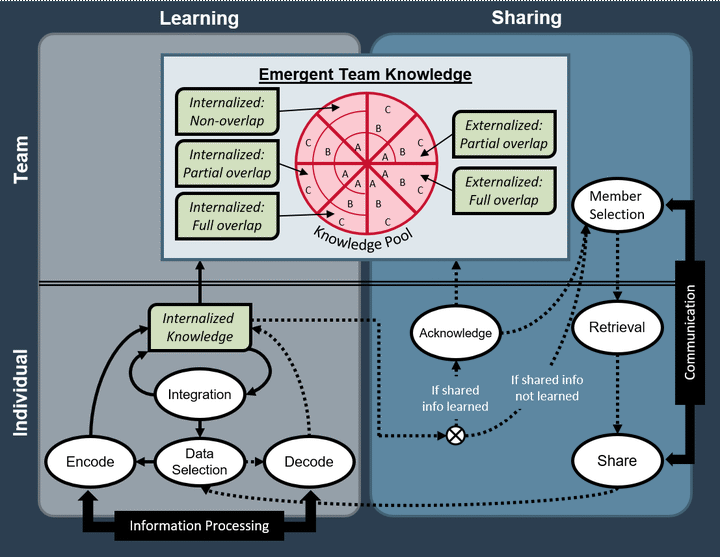Emergence of collective and distributed knowledge in teams

Funding Sources
- Office of Naval Research, Command Decision Making Program
- Award #: N00014-09-1-0519
- Army Research Institute for the Behavioral and Social Sciences
- Award #: W911NF-14-1-0026
Collaborators
- Mike Braun (DePaul University)
- Goran Kuljanin (DePaul University)
- Steve Kozlowski (Univ of South Florida)
- Georgia Chao (Univ of South Florida)
Summary
Since the concept of team cognition was first proposed and popularized in the organizational sciences, a great deal of theory and empirical research has accumulated examining its impact on team functioning and effectiveness. Although there are now numerous different conceptulations of team cognitio, the concept has most commonly been examined from the perspective of shared mental models (extent to which individual members of a team hold similar cogntiive representations of the team and its task) and transactive memory systems (extent to which collectively relevant knowledge about the team and its task is distributed across yet accessible to individual members). There is sufficient meta-analytic evidence to suggest that both conceptualizations of team cognition are important to the performance and decision quality of teams. However, a coherent understanding of how groups develop, integrate, and adapt these forms of shared cognition remains incomplete. That is, little attention has been directed towards the dynamic processes through which knowledge is acquired, compiles, and manifests within teams. The manner by which team knowledge is created and sustained remains a “black box.”
A lack of theoretical and empirical attention towards unpacking this black box and revealing the processes responsible for team knowledge emergence is problematic for at least two reasons. First, the development and maintenance of knowledge at the team level inherently involves intra- and inter-member processes unfolding over time. However, what these processes are and how they interact to facilitate team cognition are not well explicated. Second, ignoring the process of team knowledge emergence limits inferences about why teams may be more or less successful at achieving desired levels of team cognition. Focusing on static, variable-to-variables relationships between predictors and team knowledge outcomes (i.e., higher team ability -> better team cognition) can suggest conditions that correlate with the development of collective knowledge. However, such research does not provide insight into how or why these conditions lead to improved knowledge outcomes. Systematically exploring these questions requires concerted efforts to develop more precise theory and conduct more focused empirical research that capture the events, actions, and cognitive processes that contribute to the development of both individually held and collectively shared knowledge.
My primary focus of research in the domain of team cognition is thus directly oriented towards specifying and studying the dynamic processes involved in developing team cognition. In some of my initial work in this domain, my colleagues and I advanced a formal theory and computational model that elaborated several core concepts and mechanisms of knowledge emergence in teams. Our simulations with the model revealed several leverage points for facilitating convergent team cognition, such as improving the rates at which individual members learn information and regulating the rates at which information is shared/exchanged by individuals. We then constructed a novel team knowledge-building task and conducted an empirical study which lent support to these model predictions and therefore the core model mechanisms. In future research in this domain, I am interested in further examining the effects of individual vs. joint attention, the role of path dependence in team knowledge and decision-making (i.e., extent to which previously known/shared information and decisions shapes subsequent attention to information and choices by teams), and incorporating the effects of goals and differences in individuals' understanding of “why” and “what” interpretations impact the emergence of collective knowledge.